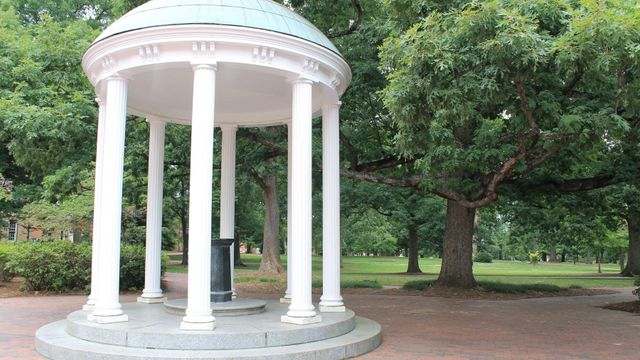UNC-CH, NCSU to resume classes on campus in August
Students will return to campus at both the University of North Carolina at Chapel Hill and North Carolina State University for the start of a new school year in early August, officials at both schools announced Thursday.
The UNC system shifted almost exclusively to online classes in mid-March to combat the coronavirus pandemic, canceling or postponing graduation ceremonies in the process.
University system officials and administrators at each of the 17 campuses have been working for weeks to develop plans for bringing students back while ensuring both their safety and the health of faculty and staff.
“The best Carolina experience is one that occurs here on campus," UNC-Chapel Hill Chancellor Kevin Guskiewicz told his Board of Trustees during a Thursday morning meeting. “If it’s safe to be on campus, then it’s best for us to be on campus, and we’ll do everything within our power to make that possible."
Students will start returning to campus on Aug. 3, when move-in times will be handled by appointment. Classes will start on Aug, 10.
Starting earlier – the school year had been scheduled to begin Aug. 18 – and skipping the traditional fall break in October will allow UNC-Chapel Hill to complete its final exams for the semester by Nov. 24 – before the Thanksgiving break, Guskiewicz said.
Students could then leave campus and not return until early 2021, which would allow the university to stay ahead of a potential second wave of coronavirus infections, he said.
"The fall semester will be like no other in our history," he said. "There are many areas that are still in the planning phase."
University administrators continue to develop community standards for how UNC-Chapel Hill will operate when classes resume, including requiring face masks, practicing physical distancing and increased cleaning. Public health officials, faculty and staff are providing input on the plans.
- Class sizes and the time between classes will be adjusted to allow for appropriate distancing within classrooms and inside buildings. Entrances and exits will be converted for one-way traffic.
- Students will continue to have double-occupancy rooms, but two dormitories will be set aside to handle virus-related cases – one to isolate infected students and one where students possibly exposed to the virus can quarantine themselves.
- Many faculty will be asked to prepare courses for both in-person and remote instruction for more flexibility.
- A new initiative called “Carolina Away” will enable 1,000 students who can’t come to campus for various reasons to take courses completely online.
- Faculty and staff will return in phases and work staggered or alternating schedules. Some will continue to work remotely, and work areas on campus will be reconfigured.
Students and faculty can undergo frequent testing for the virus during the semester as part of a UNC study, said Audrey Pettifor, an epidemiologist in UNC-Chapel Hill's Gillings School of Global Public Health.
"We’re planning to test people before they come back," Pettifor said, "so we can have some sense of how many people in our research community already have been exposed to the virus but also how many people have active virus."
"We expect to have dozens of cases among students," said Dr. Mike Cohen, director of the UNC Institute for Global Health and Infectious Diseases. "We expect most of them to do well, but if we have clusters of a whole dorm getting infected, that would lead us toward [thinking] this is so transmissible, this is a bad idea."
Guskiewicz said there will be several "off ramps" on UNC-Chapel Hill's roadmap to reopening, which will allow the university to pivot as pandemic conditions change.
"We’re used to challenges and big problems like this one," he said. "We’re not in a race to be first at this. We’re actually in a race to be right, or as close to right as we can possibly be."
NCSU: Less student travel means less exposure
N.C. State is taking a similar route to resuming classes on campus, Chancellor Randy Woodson said in a letter to students, faculty and staff.
Classes will start nine days earlier than previously scheduled. Fall break has been canceled and finals will be held before a combined Thanksgiving and winter break.
"The driving factor behind this schedule is the health, safety and well-being of students, faculty and staff," Woodson said. "Many public health experts believe our nation and our state could face a second wave of COVID-19 sometime in late fall or early winter. This guidance led us to start and finish the semester early in an effort to try and stay ahead of a potential second wave."
Minimizing student travel by eliminating fall break and combining the breaks over Thanksgiving, Christmas and New Year's will limit students being exposed to the virus outside of North Carolina or the U.S. and then bringing it back to campus, he said.
"The last two months have been not only unprecedented, but for many in our community, very challenging," he said. "COVID-19 has disrupted and affected all in our Pack. But in the Wolfpack way, you stepped up, overcame the difficulties and pushed not only yourselves but our entire community forward."
Duke: Plans still in works
Duke University is still crafting a plan for students to return, and details will be released by the end of June, President Vincent Price said Thursday.
"Why not decide now? We're committed to getting this right," Price said in a video statement to students, faculty and staff. "Responsible decision-making must be based on a clear understanding of public health and safety issues than is now available.
Some Duke faculty and staff are starting to return to work on campus, and he said that effort will educate administrators as they plan for thousands of students to return.
"The next six weeks should give us far more reliable information upon which we will base our decisions," he said.
Like the other universities, Duke will make changes to its class schedule and classroom configuration and use a combination of in-person and remote instruction to keep students safe as they learn, Price said.











